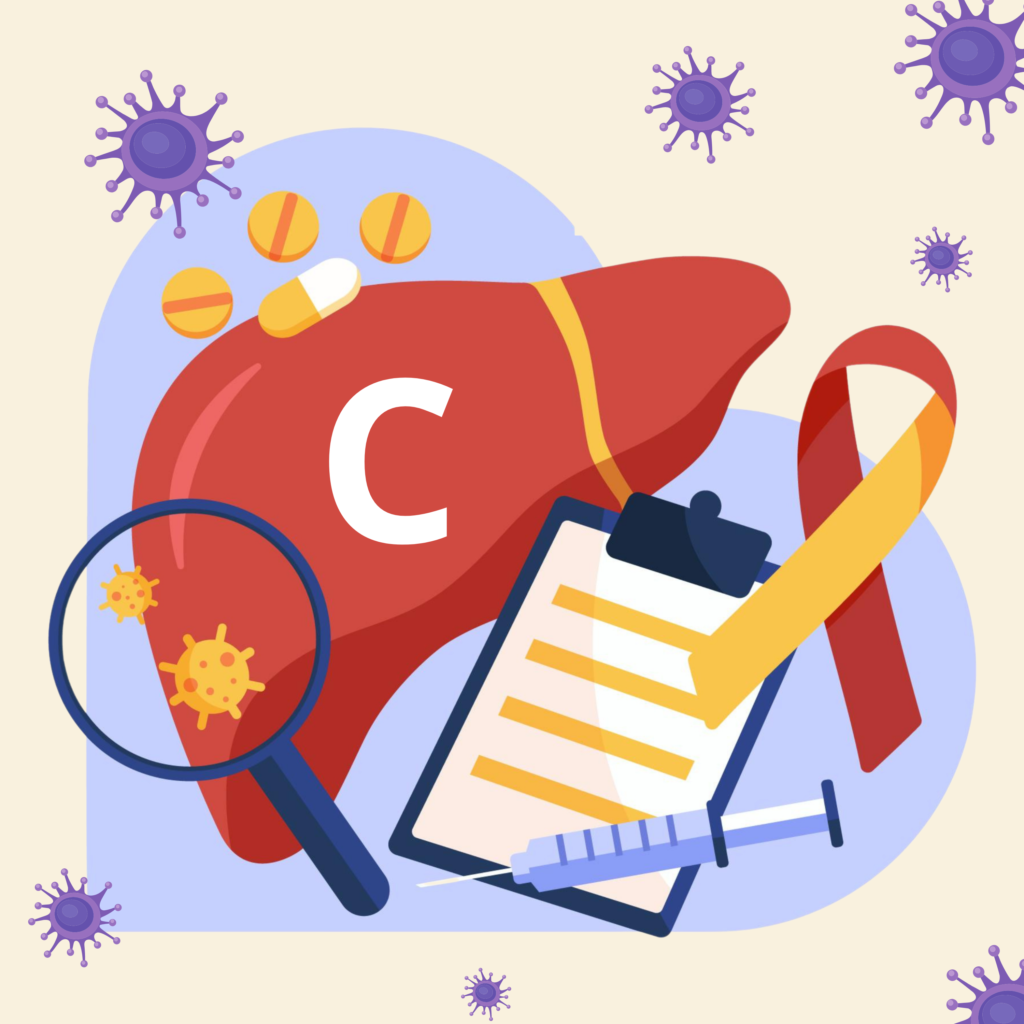![[HEALTHCARE NEWSLETTER AUGUST/2022]: HEPATITIS C DISEASE](https://insmart.com.vn/wp-content/uploads/2022/07/1.-Viem-gan-C-1024x615.jpg)
Hepatitis C belongs to a group of dangerous liver diseases, but most people are still subjective because they do not fully understand this disease. The disease tends to progress silently, without obvious symptoms, making it difficult to identify the disease early.
1. Symptoms of Hepatitis C Virus
💎 Acute stage
Hepatitis C virus is a blood-borne disease with an incubation period of 2 weeks to 6 months. In the early stages, about 80% of people will not have any symptoms of HCV. This stage is called acute hepatitis C virus.

If symptoms develop, they usually occur a few weeks after infection with the virus, and include such symptoms as:
- Stomachache
- Clay colored stools
- Dark urine
- Nausea and vomiting
- Anorexia
- Tired
- Fever
- Yellowing of the skin and whites of the eyes
💎 Chronic stage
If hepatitis C virus is recurrent or prolonged because the virus that causes the disease remains in the body for many years, it will progress to the chronic stage. At this time, symptoms can be different from the acute phase, including symptoms such as:
- Constantly tired
- Abdominal pain, bloating, indigestion
- Weight loss
- Musculoskeletal pain
- Ascites – accumulation of fluid in the abdomen
- Easy bruising
- Yellowing of the skin and whites of the eyes
- Hives or rash
- Itchy skin
- Spider hemangioma
- Hepatic Encephalopathy is an altered state of consciousness caused by liver failure. This causes poor concentration, confusion, poor memory, and sleepiness.
If it is not treated in time, liver cells will be damaged and scar tissue will continuously replace the damaged tissue leading to cirrhosis. Typical signs of cirrhosis include vomiting blood, dark stools, jaundice, and fluid accumulation in the legs or abdomen. If this condition lasts for a long time, it will cause serious liver damage.
2. Current Hepatitis C treatments and success rates

About 15 – 25% of patients with acute hepatitis C do not need treatment to recover on their own, the remaining 75 – 85% of cases will progress to the chronic stage. For patients with chronic hepatitis C, the use of antiretroviral drugs is a necessary method.
The purpose of drug treatment is to destroy the hepatitis C virus, prevent liver damage or slow down the process of liver damage, reduce the risk of cirrhosis, liver cancer, impaired liver function and reduce the risk of having to undergo liver transplantation.
In the years before 2011, treatment of chronic HCV used immunomodulatory drugs containing Peg-interferon (Peg-IFN) injectable in combination with oral ribavirin (RBV) for 24-48 weeks, but this regimen has a low success rate and many side effects.
Direct-acting antivirals (DAAs):
Currently, the introduction of many direct-acting antivirals (DAAs) have helped patients with chronic HCV infection to be completely cured and to avoid many side effects. The outstanding advantages of DAAs are good tolerability, better efficacy and sustained virologic response (SVR) up to 95%, the duration of treatment is shortened (down to 8-12 weeks depending on the individual drugs), reducing many unwanted side effects.
Today, guidelines and recommendations for chronic HCV regimens are mostly based on DAAs. The mechanism of action of DAAs is to act on proteins necessary for viral replication and replication. 3 main groups of DAAs are classified based on their mechanism of action: NS3/4A inhibitors include Glecaprevir (GLE), Voxilaprevir (VOX), Grazoprevir (GRZ); NS5A inhibitors include Daclatavir (DAC), Velpatasvir (VEL), Ledipasvir (LDV), Pibrentasvir (PIB), Elbasvir (ELB); NS5B Polymerase inhibitors include Sofosbuvir (SOF).

Experts highly evaluate the effectiveness of new generation hepatitis C drugs (95% of cases using DAAs were diagnosed with no signs of HCV virus in the body). However, research on drugs to treat this disease is still evolving and the list of drugs can change from year to year. The most important thing is that the patient must strictly follow the instructions of the treating doctor.
Note, DAAs are not indicated for pregnant women or children under 3 years of age. In addition, the ribavirin combination regimen (RBV) is contraindicated in certain subjects such as severe anemia with hemoglobin <8 g/dl, uncontrolled heart failure, COPD, severe infection or severe underlying medical condition.
Hepatitis C treatment duration:
The treatment time is fast or slow depending on the severity of the disease and each specific patient. However, usually the treatment process for hepatitis C can last from 8 to 12 weeks, there are also many cases that need treatment for 16 weeks, even 24 weeks due to severe liver damage, but this is usually very rare.
Monitor response after HCV treatment:
Successful treatment of hepatitis C when the patient achieves a sustained virologic response after 12 weeks of treatment is SVR12. After stopping treatment, it is necessary to monitor for complications of cirrhosis, hepatocellular carcinoma and test for HCV RNA or HCV Core Ag to ensure that the patient does not relapse. If treatment fails, it needs to be considered as virological failure (relapse, viral outbreak, failure on treatment) or non-viral failure (patient stops treatment for various reasons, patient dies,…). When the initial regimen of DAAs fails, specialist consultation is needed to select an alternative regimen.
Reference: medlatec.vn & bvnguyentriphuong.com.vn
Part 3: Insmart’s Health Screening Program Administration Service

Insmart is the leading health screening program administration unit in Vietnam, we always aim to ensure the sustainability of healthcare for business. We provide a full range of utilities to support customers during the examination, ensuring that customers receive the dedicated and attentive care in the using service process.
With over 10 years of experience in working with medical providers and affiliated networks in many provinces, Insmart has been providing the most professional, practical, and preeminent Management and Organization solutions of Health check-up for partners and businesses.
Through this service, we provide professional health screening programs, which help to save human resources in the accounting costs process with medical providers, acquire the most favorable price for medical examination, treatment services, and enhance employee’s experiences about company compensation and benefits.
If you are planning to organize a health screening program for employees, please contact Insmart via email: mkt@insmart.com.vn for detailed program planning advice.
Please find more information about our service at:
Website: www.insmart.com.vn
Fanpage: https://www.facebook.com/insmartvn/
LinkedIn: www.linkedin.com/company/insmart-vietnam
[Marketing Department – Insmart JSC]


